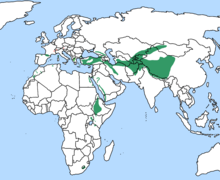Gypaetus barbatus
| Bearded vulture | |
|---|---|
 |
|
| Scientific classification | |
| Kingdom: | Animalia |
| Phylum: | Chordata |
| Class: | Aves |
| Order: | Accipitriformes |
| Family: | Accipitridae |
| Subfamily: | Gypaetinae |
| Genus: |
Gypaetus Storr, 1784 |
| Species: | G. barbatus |
| Binomial name | |
|
Gypaetus barbatus (Linnaeus, 1758) |
|
 |
|
| Distribution of Gypaetus barbatus | |
The bearded vulture (Gypaetus barbatus), also known as the lammergeier or ossifrage, is a bird of prey and the only member of the genus Gypaetus. Traditionally considered an Old World vulture, it actually forms a minor lineage of Accipitridae together with the Egyptian vulture (Neophron percnopterus), its closest living relative. It is not much more closely related to the Old World vultures proper than to, for example, hawks, and differs from the former by its feathered neck. Although dissimilar, the Egyptian and bearded vulture each have a lozenge-shaped tail — unusual among birds of prey. In July 2014, the IUCN Red List has reassessed this species to be near threatened. Before July 2014, it was actually classed as Least Concern. Their population trend is decreasing.
The bearded vulture is the only known animal whose diet is almost exclusively bone (70-90%). It lives and breeds on crags in high mountains in southern Europe, the Caucasus,Africa, the Indian subcontinent, and Tibet, laying one or two eggs in mid-winter that hatch at the beginning of spring. Populations are resident.
The bearded vulture is sparsely distributed across a considerable range. It may be found in mountainous regions from Europe through much of Asia and Africa. In Eurasia, it is found in the Pyrenees, the Alps, the Caucasus region, the Zagros Mountains, the Alborzs, the Koh-i-Baba in Bamyan, Afghanistan, the Altai Mountains, the Himalayas, Ladakh in north India, western and central China, Israel (Where although extinct as a breeder since 1981, single young birds have been reported in 2000, 2004 and 2016 ), and the Arabian Peninsula. In Africa, it is found in the Atlas Mountains, the Ethiopian Highlands and down from Sudan to northeastern Democratic Republic of the Congo, central Kenya and northern Tanzania. An isolated population inhabits the Drakensberg of South Africa.
...
Wikipedia

